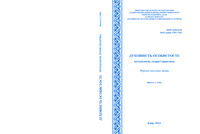PROBLEMS OF FORMATION OF THE ETHICAL BASIS OF PROFESSIONAL COMMUNICATION IN THE ADAPTATION PERIOD OF THE PROFESSIONAL TRAINING OF THE FUTURE ACTOR
DOI:
https://doi.org/10.33216/2220-6310/2023-106-2-194-204Keywords:
future actor, ethics, educational team, creativity, art, theater, teacher, society, student, professional disciplines, adaptation, method, creative potential, sketch, performance, role, professional communicationAbstract
This article is devoted to the analysis of problems related to the formation of ethical foundations of professional communication in the adaptation period of professional training of the future actor. During this period, students of acting have numerous problems related to professional and social adaptation, which requires the establishment of interaction with colleagues, teachers and other employees of a higher educational institution.
The authors emphasize the specific features of the actor's professional activity, the means of forming professional abilities and skills, which is possible only in an atmosphere of benevolence and pedagogical attention, taking into account the rules of professional ethics in the relationship between students and teachers of professional disciplines. Important aspects of ethics, such as mutual respect, tolerance, compassion and empathy, are explored, which are necessary for building successful interpersonal relationships and the perception of the actor's professional growth.
The article analyzes the problems of forming moral and ethical norms of professional communication of future actors in the educational team and provides recommendations for improving ethical skills and building successful interpersonal relationships in the student environment. The also examines the problems of forming relationships between students and teachers, considers the important principles of pedagogical communication that contribute to successful learning. The article examines the main ethical principles of communication – mutual respect, honesty and openness, gives advice on the formation of ethical skills in students and teachers. In particular, attention is drawn to the importance of active listening, open perception of opinions and mutual understanding.

